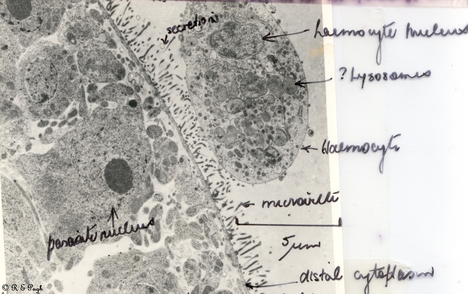Taxonomy: f. Dilepididae
Animal: Dipylidium caninum 20 06.jpg
Sites:
Comment:
Dipylidium caninum developing metacestode in a haemocoele of the intermediate host, a male adult cat flea, C. felis felis - TEM. The metacestode has evoked a host reaction as seen by the adhering flea haemocyte in this flea reared at 20 degrees C/ 3mm Hg and 38 days post infection. Flea larvae are infected by eating the eggs of D. caninum in the egg capsules passed from the intestine. Below 30 degrees C the parasite does not become infective until the infected adult fleas have infected mammals for 5 - 7 days, the mammalian surface temperature of 32C is essential for the parasite to complete its development in the flea as the parasite cannot complete its development at 20C (Pugh 1985 PhD thesis - - see Bibliography for details) Temperature and relative humidity were found to have a marked effect on the development of both the host and the parasite but development of the parasite in the flea is not linked to the development of the flea. Host reaction was more marked and prolonged at 20 - 25 degrees than at higher temperatures. (see Pugh, 1987 Parasitol Res 73;171-177 and Pugh & Moorhouse 1985 Z.Parasitenkd 71;765-775).
First Picture |
Previous Picture |
Next Picture |
Last Picture

